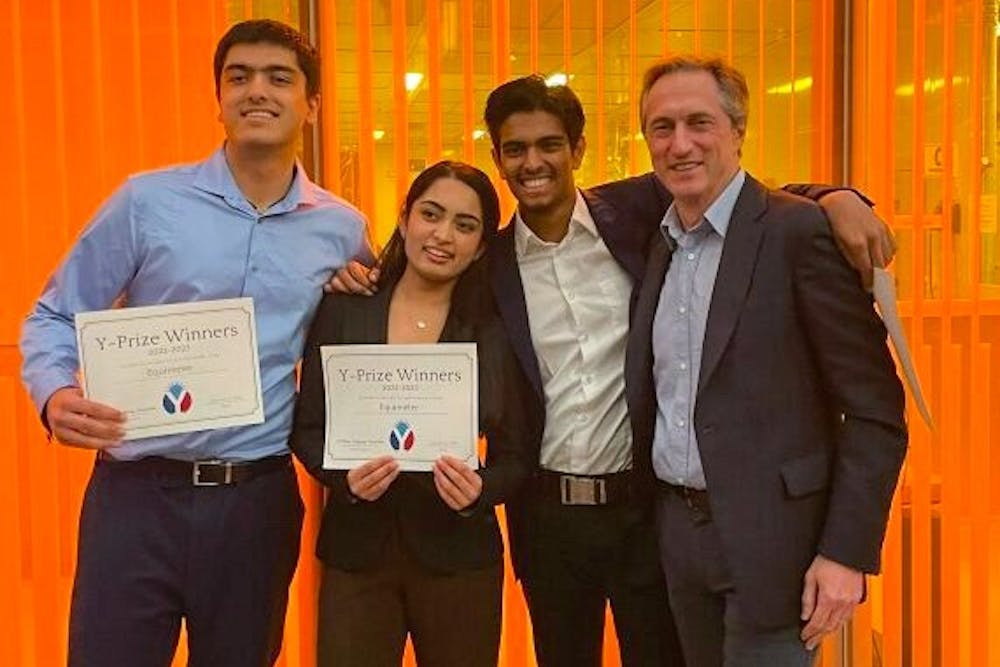A group of students in the Roy and Diana Vagelos Program in Life Sciences & Management won the 2023 Penn Y-Prize Competition.
The winning team, Equimeter, won for their physics-informed neural network technology to improve pulse oximetry in patients with darker skin. The team consisted of LSM sophomores Ujjayi Pamidigantam, Parthiv Patel, and Advait Thaploo. They were awarded $10,000, and their proposals were automatically entered into the semi-final round of the Penn Venture Lab Startup Challenge.
Equimeter won for their physics-informed neural network technology to improve pulse oximetry in patients with darker skin. The team consisted of LSM sophomores Ujjayi Pamidigantam, Parthiv Patel, and Advait Thaploo. They were awarded $10,000, and their proposals were automatically entered into the semi-final round of the Penn Venture Lab Startup Challenge.
The 11th annual Y-Prize competition — which challenged students in all Penn schools to develop commercialization ideas for emerging technologies — took place in February as a joint initiative between Penn's School of Engineering and Applied Science, The Mack Institute for Innovation Management, and The Penn Center for Innovation.
The competition was a two-stage process. First, 17 teams created a pitch video describing an application for one of two Penn-created technologies and how that application can be brought to an industry. Then, four teams were selected as finalists to participate in a final pitch competition.
One of the two technologies used by the winning team was solar powered aerial vehicles, which use only sunlight to levitate and reach altitudes that are too high for other aircrafts. The second technology was physics-informed neural networks, which combine physics with artificial intelligence to learn about the neural response system.
Equimeter applied the PINNs technology after discovering that pulse oximeters — which clip to a patient’s finger and use light intensity to measure blood oxygen — work less effectively in patients with darker skin.
Thaploo said Equimeter sought to solve this problem by using PINNs to adjust light intensities for every skin color.
RELATED:
Penn Venture Lab and Red & Blue Ventures co-host Penn's first VC Pitch Night
Four Penn students win Y-Prize for Catheter That Prevents Bacterial Infections
“We saw that a neural network implemented in hospitals could help adjust for the skin color factor and make these readings more accurate,” Thaploo said.
Patel said that the team's major selling point was having experts in the healthcare industry and patients who use pulse oximeters verify that their model provided a solution to a real problem they faced.
For Pamidigantam, the most challenging aspect of the competitions was finding the best ways to apply novel technology.
“[This competition] is difficult because these technologies are very niche, and the applications are not well-developed, so you are filling a big gap in a market that is not well explored,” Pamidigantam said.
Mack Institute marketing & communications coordinator Emma Needleman said her favorite part of the competition was witnessing students from a range of schools and majors interact with each other.
“We really like to see students collaborating across schools, and you can often see students with different backgrounds and experiences and get a really interesting story,” Needleman said. “The competition is a really great way for people to break out of their silos and think a little bit differently while bringing their own unique experiences to the table.”
Thaploo said the team is now excited to proceed to the venture lab competition to raise awareness of how PINNs could be applied.
“Our goals are to develop a proof of concept of our technology interfaced with more health care executives and providers, expand our reach in the community and ensure that we put our best foot forward,” Thaploo said. “The ultimate goal for us is really to bring this to the market because we really believe in the technology, and we think that it can make a real change in health equity.”









